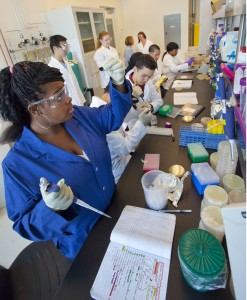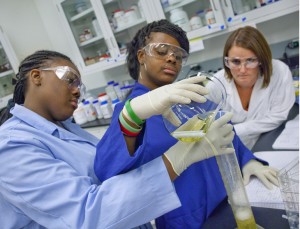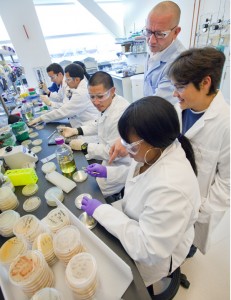
iCLEM provides paid internships to underserved Bay Area high school students. The program is jointly sponsored by the Synthetic Biology Engineering Research Center, the Joint BioEnergy Institute and the National Science Foundation. (Photo by Roy Kaltschmidt, Berkeley Lab Public Affairs)
Experience is said to be the best teacher but even better is hands-on-experience while partnered with a teacher and drawing a salary. That is the basic premise behind iCLEM – the Introductory College Level Experience in Microbiology program. Aimed at high school students who trend outside the typical curve of academic enrichment programs, iCLEM is an eight week paid summer internship in which six students and two teachers from the San Francisco Bay Area work side-by-side in a state-of-the art microbiology laboratory on a research project related to bioenergy. The iCLEM program is sponsored by the Synthetic Biology Engineering Research Center (SynBERC), the Joint BioEnergy Institute (JBEI) and the National Science Foundation (NSF).
“We look to provide an opportunity that could make a a critical difference in the lives of students who are from economically disadvantaged backgrounds and have little or no family history of college attendance,” says Clem Fortman, a post-doctoral researcher in metabolic engineering with JBEI’s Fuels Synthesis Division who co-founded iCLEM three years ago with James Carothers, another post-doc with appointments at both JBEI and SynBERC.
“We’ve found that given a chance to excel, these students make the most of the opportunity,” Fortman says. “To date, participants in iCLEM have had a 100-percent college acceptance rate. Not all will go on to study science, of course, but they will have been exposed to basic science and research. In addition they get experience in numerous college preparation activities, including developing a résumé, writing a statement of purpose, researching colleges, meeting with admissions officers, and making campus visits.”
Adrienne McKee is a post-doctoral researcher in JBEI’s Fuels Synthesis Division who is working with Fortman on this year’s version of iCLEM, along with Milton To, an undergraduate at the UC Berkeley studying to be a science teacher. She says the program’s inclusion of high school science teachers is a major plus.
“In working directly with the students on projects, the teachers are able to help both the students and us, while maybe learning something new themselves,” McKee says.

Kate Trimlett (right), a science teacher at Berkeley High School’s Green Academy in her second year with the iCLEM program, is able to both learn and teach as she works along side students such as Destiny Joseph (left) of Mission High School in San Francisco, and Dejanae Holloway, Ralph J. Bunche High School, Oakland. (Photo by Roy Kaltschmidt, Berkeley Lab Public Affairs)
Kate Trimlett, a science teacher at Berkeley High School’s Green Academy in her second year with iCLEM concurs. “The opportunity to teach and learn simultaneously has been great for my own professional development. It’s also been good for my students because I’ve been able to apply the scientific protocols I’ve learned through iCLEM to my laboratory classes.”
Trimlett says that the students at iCLEM are not only learning about science, they are also improving their communication skills by preparing their data for publication, maintaining lab logs, writing reports and preparing scientific posters.
“When we have gone on field trips, the students are called upon to explain about the project they’ve been working on and they do a really good job of it,” Trimlett says.
Under a system in which teachers are rotated out of the program every two years, Trimlett, in addition to her teaching and learning, also serves as a mentor to Lindsay Penrose, a biology teacher at Mission High School in San Francisco who is in her first year at iCLEM.
“I am excited to take part in such fascinating research, and to share it with a great group of students,” Penrose says.

Clem Fortman and Adrienne McKee (standing), post-docs with the Joint BioEnergy Institute, oversee iCLEM, a paid internship that enables underserved Bay area high school students to participate in actual scientific research while gaining experience in numerous college prep activities and earning money. (Photo by Roy Kaltschmidt, Berkeley Lab Public Affairs)
The iCLEM students are paid a stipend of $2,500 for their eight weeks of work. Participants are selected not on the basis of grades, but on the basis of being curious about science, interested in learning and motivated to accomplish something.
“We look for students who convey their interest and enthusiasm in the internship through their written application, teacher recommendation, and in an interview,” says Fortman. “The ideal student for us is not only curious about science, but also excited by challenges, enjoys working in a team setting, and is eager to work hard and ask questions.”
The iCLEM students selected for this year are Ilieya Cooper, Vista High School, Richmond; Dejanae Holloway, Ralph J. Bunche High School, Oakland; Destiny Joseph, Mission High School, San Francisco; Edgar Mendoza, Oakland Technical High School, Oakland; Emiliano Ruiz, Berkeley High School, Berkeley; and Abraham Salazar, Oakland Unity High School, Oakland.
During this summer’s iCLEM session, which began June 21 and will end on August 13, students and teachers work a schedule that runs from 9:00 am to 5:00 pm, Monday through Friday. In addition to the bioenergy research project, the iCLEM curriculum also includes field trips to Bay Area biotech companies and research universities, and lectures from leading scientists at JBEI and SynBERC.
Fortman is quick to acknowledge the strong support of the iCLEM program by Jay Keasling, the much acclaimed synthetic biology authority who directs both JBEI and SynBERC.
“Without Jay Keasling’s support, the iCLEM would not exist,” Fortman says.
All of the iCLEM laboratory work is carried out at JBEI, which is located in Emeryville. JBEI is one of three Bioenergy Research Centers funded by the U.S. Department of Energy to advance the development of the next generation of biofuels. It is a scientific partnership led by Lawrence Berkeley National Laboratory (Berkeley Lab) and including the Sandia National Laboratories, the University of California (UC) campuses of Berkeley and Davis, the Carnegie Institution for Science, and the Lawrence Livermore National Laboratory.
SynBERC is also a multi-institution partnership, funded by the National Science Foundation, that is aimed at “making biology easier to engineer.” Its mission is to lay the foundation for the emerging field of synthetic biology through the development of foundational understanding and technologies that will enable researchers to design and build standardized, integrated biological systems that can carry out specific functions. The SynBERC partnership is led by UC Berkeley and includes UC San Francisco, Harvard, MIT, Stanford, and Prairie View A&M University.
Coordinating the administration of the iCLEM program are Kate Spohr of SynBERC and Ellen Ford of JBEI.
Additional Information
For more information about SynBERC visit the Website at http://www.synberc.org/
For more information about JBEI visit the Website at www.jbei.org